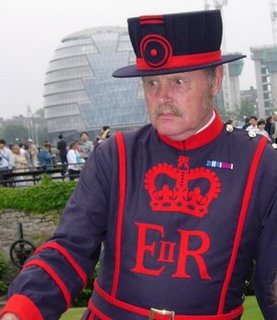
Graham Chapman, in a Python sketch now lost in the mists of time, once labelled all that was good as woody and all that was beyond the pale as tinny. Well, Chris Dillow is woody. There are no two ways about it. His politics may not precisely align with mine but I couldn’t give a toss about that. The man has been quoted this way:
The ever excellent Chris Dillow makes some good points about power:
· Power doesn’t merely corrupt. It enslaves. Many rulers are not as free as we think. This, in a different context, is one message of Xenophon’s Hiero.
· What matters in politics is not the particular individual occupying any office. Office determines character more than character determines office.
· There’s something deeply dysfunctional about political institutions. The great thing about markets is that they cause bad people, acting for bad motives, to do good things. Our political institutions cause good people, acting for good motives, to do bad things.
I first became aware of him when he posted an encouraging comment on my site which I now quote quite often:
You can get tons of comments simply by saying something inflammatory about the Middle East - but almost all those comments will be worthless or worse. By contrast, a good post that conveys interesting facts might get no comments at all. Clive Davis and Tim Worstall, for example, get far fewer comments but they're much better bloggers.
[I'd have to modify this quote in that the latter may have fewer comments, but at 2334 hits a day, he's hardly ignored.] Now I’m going to say right up front about Chris that any man who inserts statistical aberrations on the ongoing cricket outrage into his blog – that this man deserves to be read and taken seriously. For example:
The number of county championship titles multiply by a dummy if a county contains a Test ground. Logic tells us that stronger counties - as measured by the number of championships they've won - should produce more Test players. Oddly, though, this is true only of counties with a Test ground.
These two facts alone explain three-quarters of the variation in counties' test caps. What's even more amazing is the size of the home county effect. The home counties have, on average, 206 more Test caps than other counties. As the average county has only 345 caps, this is a lot.
The only other chap I’m currently aware of, [not that that necessarily means anything], who does this sort of thing, is Norman Geras, who himself has completely scooped me by publishing an interview with Chris in which most questions are answered.
All I can do is quote from it and leave the rest to you:
The normblog profile 112: Chris Dillow was born in Leicester in 1963, at the same time as John F. Kennedy was being buried; someone had to make room. He went to Wyggeston Boys School (a grammar), Corpus Christi College, Oxford, and the University of Manchester. He then drifted into the City for a few years before joining the Investors Chronicle, though he strenuously denies accusations that he's a journalist. Chris lives alone in Belsize Park, and blogs at Stumbling and Mumbling.
Why do you blog? > I'm arrogant enough to think I've got something worth saying, and stupid enough to think anyone cares.
What has been your best blogging experience? > The kind words of many good, intelligent people, which I have been too ungracious to properly acknowledge.
What has been your worst blogging experience? > Realizing that time and inspiration are negatively correlated.
What would be your main blogging advice to a novice blogger? > It's better to be wrong but interesting than right but dull.
What is your favourite song? > 'After All' by Dar Williams – just ahead of Hank Williams's 'They'll Never Take Her Love From Me' and Iris DeMent's 'Childhood Memories'.
What would be your most important piece of advice about life? > Terry Allen gave the best advice for anyone wanting a successful career: 'Don't ever do the best you can do. It's better to be mediocre.'
In what circumstances would you be willing to lie? > Any time. The truth is a precious thing. Like all precious things, it shouldn't be wasted on idiots.
If you were to relive your life to this point, is there anything you'd do differently? > There're a few explicit offers of jobs and implicit offers of sex I'd have accepted, but otherwise not much. That's the power of adaptive preferences for you.
Who would play you in the movie about your life? > Mitch Pileggi looks the part. Can he do a Leicester accent?
Where would you most like to live (other than where you do)? > Leicestershire.
If you had to change your first name, what would you change it to? > Frank, my grandad's name.
If you could have any three guests, past or present, to dinner who would they be? > Kathy Sykes, Shania Twain, Gillian Anderson. Hey, I'm a single bloke.
For the political/philosophical aspects, you’ll have to go to the normblog profile [a weekly Friday morning feature], although I can add that he did his PPE at Oxford and then a Masters in Economics at Manchester. In my own correspondence with Chris these thoughts were expressed:
I regard myself as an economic migrant; I only live in London coz I need the work. Unlike many others, I don't regard my blog as primarily a vehicle for promoting a particular political line. I suspect I blog mainly to show off how clever I am; I've never been sure about anyone's motives for doing anything, even myself. Insofar as there is one, the line is anti-managerialist; I try to combat the view that organizations and society can be managed from above.
What distinguishes me from bog-standard libertarians is the belief that central plannning is bad within companies, as well as government, and my view that greater equality of income and wealth is necessary for greater equality.
I think I'm a bog-standard post-Marxist left-libertarian; my main intellectual influences are Jon Elster, John Roemer and Alasdair MacIntyre. A non-line is that I'm passionately uninterested in foreign affairs; I can’t see what the fuss is about in Israel or Iraq.
However, I'm also interested in cricket and music (especially folk-country and I'm learning the guitar). These don't show up in the blog as often as they should.
Chris Dillow. Stumbling and Mumbling.
[I apologize for the line spacing in this post but Blogger plays havoc with line spacing and reverses what has been saved at the point of publishing. It also ignores spaces between sentences and sometimes inserts some of its own, which I try to reverse with br in the template. This increases posting time to around 50 minutes.]
 Douglas Adams, in Dirk Gently’s Holistic Detective Agency, wrote of the fundamental interconnectedness of all things. So what possible connection could there be between today’s interest rate crisis in Canberra and Turkmenistan’s oil outlet dilemma?
Douglas Adams, in Dirk Gently’s Holistic Detective Agency, wrote of the fundamental interconnectedness of all things. So what possible connection could there be between today’s interest rate crisis in Canberra and Turkmenistan’s oil outlet dilemma?




